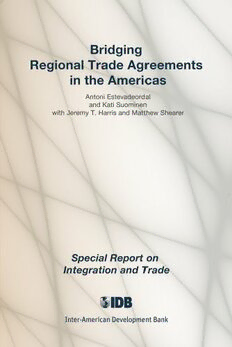
Bridging Regional Trade Agreements in the Americas PDF
180 Pages·2009·3.075 MB·English
Most books are stored in the elastic cloud where traffic is expensive. For this reason, we have a limit on daily download.
Preview Bridging Regional Trade Agreements in the Americas
Description:
Since the 1990s, countries of the Americas have liberalized their trade by means of trade agreements in different forms: unilateral opening, regional trade agreements (RTAs), and multilateral trade liberalization. Today, regional trade agreements predominate and have transformed the global and regional landscapes: they regulate roughly half of global trade and nearly all intraregional trade in the Americas. Countries have enjoyed expanded market access, greater trade and investment flows, and increased firm productivity. However, at the same time, the proliferation of these agreements has created a tangle of multiple and overlapping agreements. Each RTA may include any or all of a variety of disciplines, and these complicate the tangle even further. These complications may result in undue transaction costs for traders, investors, and governments who operate simultaneously in several markets; they may confine cost savings to a few hub countries; and RTAs necessarily exclude some countries. If RTAs continue to proliferate, countries of the region will want to consider the benefits of reducing the divisions and divergences among these agreements. Bridging Regional Trade Agreements in the Americas proposes that the countries of the Americas can reduce these divisions by gradually building bridges among the existing RTAs, starting specifically with market access provisions and rules of origin. The authors take stock of the extent of liberalization and the reach of RTAs; they examine in detail the compatibilities and divergences in market access among some 36 RTAs, and develop some practical policy options to help countries access the benefits of improved convergence.
See more
The list of books you might like
Most books are stored in the elastic cloud where traffic is expensive. For this reason, we have a limit on daily download.
